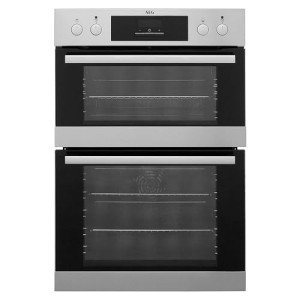Who's The Top Expert In The World On Built In Electric Oven?
페이지 정보

본문
The Comprehensive Guide to Built-in Electric Ovens and Hobs
In today's fast-paced world, contemporary kitchen appliances have developed significantly to accommodate the tastes and requirements of contemporary property owners. Among these appliances, built-in electric ovens and hobs stand out for their performance, style, and functionality. This article explores the functions, advantages, installation pointers, and upkeep of built-in electric ovens and hobs, alongside resolving often asked questions.
Comprehending Built-in Electric Ovens
What Is a Built-in Electric Oven?
A built-in electric oven is a home appliance developed to be set up into a wall or kitchen cabinetry, providing a seamless, integrated appearance in the kitchen. Unlike freestanding ovens, built in oven-in models conserve space and frequently come geared up with additional features such as self-cleaning cycles, convection cooking, and numerous cooking modes.

Types of Built-in Electric Ovens
- Single Ovens: Ideal for smaller kitchen areas or those who prepare for less individuals.
- Double Ovens: Offer more cooking space, suitable for larger families or those who entertain regularly.
- Mix Ovens: These consist of both a standard oven and a microwave, supplying flexible cooking choices.
Advantages of Built-in Electric Ovens
| Benefit | Description |
|---|---|
| Space-Saving Design | Fits seamlessly into cabinets, releasing up counter area. |
| Improved Aesthetics | Produces a modern-day, professional kitchen look. |
| Versatile Cooking Options | Often features several cooking modes including bake, broil, and convection. |
| Energy Efficient | Consumes less energy than conventional ovens. |
Comprehending Built-in Hobs
What Is a Built-in Hob?
A built in ovens and microwaves-in hob is a cooking surface set up into the kitchen counter top, integrating seamlessly with the kitchen style. Offered in electric, induction, and gas ranges, electric hobs are renowned for their accuracy and ease of usage.
Kinds Of Built-in Hobs
- Electric Hobs: Traditional coil aspects that heat via electrical resistance.
- Induction Hobs: Use magnetic energy to heat just the pots and pans, making them much faster and much safer.
- Ceramic Hobs: Feature a smooth surface with glowing heat underneath, using simple cleaning.
Benefits of Built-in Hobs
| Advantage | Description |
|---|---|
| Fast Cooking Times | Electric hobs heat quickly, decreasing total cooking time. |
| Easy to Clean | Flat surface permits fast and straightforward cleaning. |
| Resilient | Traditionally built to last and endure heats. |
| Versatile Compatibility | Works well with numerous pots and pans products. |
Setup Considerations
Installing a built-in electric oven and Built-In Electric Ovens hob needs mindful preparation.
Actions for Installation
- Measure the Space: Ensure the dimensions of the oven and hob match the designated space in your kitchen.
- Examine Electrical Requirements: Consult an electrician to guarantee wiring can manage the home appliance's power needs.
- Positioning of Appliances: Position the intergrated oven and hob at a practical height, typically between waist and eye level.
- Ventilation: Ensure proper ventilation, particularly if your oven incorporates a range hood.
Important Tools
- Power drill
- Screwdrivers
- Level
- Measuring tape
Safety Precautions
- Constantly disconnect the power before installation.
- Follow producer guidelines carefully.
- Think about employing an expert for electrical connections.
Maintenance Tips
Maintaining built-in electric ovens and hobs is important for longevity and efficiency.
Regular Care Routine
- Cleaning up the Surface: Use a soft fabric and manufacturer-recommended cleaner.
- Examining Electrical Connections: Check cords and plug for damages periodically.
- Cleaning up Filters: If the oven has a ventilator, tidy or change the filters as required.
Fixing Common Issues
| Concern | Possible Solution |
|---|---|
| Oven Won't Heat | Inspect the power supply and heating element. |
| Heating Inconsistency | Inspect the thermostat and oven calibration. |
| Hob Not Heating | Ensure cookware works and examine the power supply. |
Often Asked Questions
1. How do I choose the ideal size built-in electric oven?
Picking the right size includes measuring your kitchen space and thinking about just how much cooking you generally do. If you amuse often or have a large household, go with a double oven.
2. Are built-in electric hobs safe to use?
Yes, built-in electric hobs are safe, particularly induction hobs which just warm the pots and pans, lowering the danger of burns.
3. Can I install a built-in oven and hob myself?
While it is possible for skilled DIY lovers, working with a professional is suggested, particularly for the electrical connections.
4. How frequently should I clean my built-in oven and hob?
Cleaning up should be done routinely after use, with deep cleansing periods depending on cooking frequency - typically every couple of months.
5. Do built-in appliances require special maintenance?
Built-in appliances need similar maintenance to freestanding designs, but appropriate care should be taken with their surrounding cabinets.
Built-in electric ovens and hobs provide a blend of innovation and design, offering efficiency and contemporary visual appeals to any kitchen. With proper choice, careful installation, and routine upkeep, these appliances can boost one's cooking experience for several years. Understanding the functions, advantages, and care requirements can empower homeowners to develop the kitchen of their dreams-- effectively and stylishly.
As cooking areas continue to develop into main hubs of the home, built-in electric ovens selecting the best built in ovens for sale-in solutions plays a crucial function in daily cooking creativity and enjoyment.
- 이전글A Intermediate Guide To Railroad Settlement Lung Cancer 25.05.19
- 다음글How To Choose Daycares Popular Listings 25.05.19
댓글목록
등록된 댓글이 없습니다.



